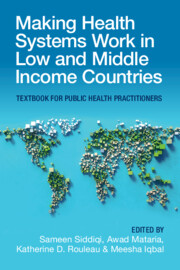 Making Health Systems Work in Low and Middle Income Countries
Making Health Systems Work in Low and Middle Income Countries from Section 2 - Transforming Health Systems: Confronting Challenges, Seizing Opportunities
Published online by Cambridge University Press: 08 December 2022
Decisions taken by stakeholders at all levels of health systems can benefit from the use of different types of evidence drawn from heterogeneous research fields – including epidemiology, clinical and basic biomedical research, and health policy and systems research (HPSR). However, out of these diverse forms of evidence, HPSR is relatively underused and under-funded. Challenges associated with the use of HPSR in health systems in low- and middle-income countries (L&MIC) include the lack of opportunity and resources, the need for greater capacity for the generation and use of evidence, and fundamental problems around how the research agenda is framed. Evidence informed decision-making in L&MICs can be improved by better alignment of HPSR with health system needs, institutionalizing the use of HPSR evidence, and strengthening individual capacities to generate and use HPSR evidence. Several global, national and local-level initiatives have helped take strides in these areas, but more work and investments are needed to strengthen the use of appropriate evidence, especially HPSR evidence, in health systems.
To save this book to your Kindle, first ensure no-reply@cambridge.org is added to your Approved Personal Document E-mail List under your Personal Document Settings on the Manage Your Content and Devices page of your Amazon account. Then enter the ‘name’ part of your Kindle email address below. Find out more about saving to your Kindle.
Note you can select to save to either the @free.kindle.com or @kindle.com variations. ‘@free.kindle.com’ emails are free but can only be saved to your device when it is connected to wi-fi. ‘@kindle.com’ emails can be delivered even when you are not connected to wi-fi, but note that service fees apply.
Find out more about the Kindle Personal Document Service.
To save content items to your account, please confirm that you agree to abide by our usage policies. If this is the first time you use this feature, you will be asked to authorise Cambridge Core to connect with your account. Find out more about saving content to Dropbox.
To save content items to your account, please confirm that you agree to abide by our usage policies. If this is the first time you use this feature, you will be asked to authorise Cambridge Core to connect with your account. Find out more about saving content to Google Drive.